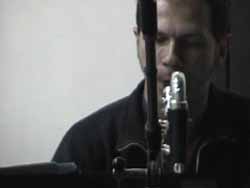
Lucio Capece | Argentina
bass clarinet, soprano saxophone
Amber
CD CS 031, Lisbon 2005
He
plays bass clarinet, soprano saxophone and a mixer in feedback controlled
by an inside amplified saxophone.
He studied classical guitar for several years until choosing the instruments
that he actually plays.Then he studied in Argentina mainly the John Coltrane's
approach to jazz and classical techniques.Then he continued studying in
France for 9 months with Louis Sclavis in 1997, and in New York and Chicago,
in 2000, meeting several musicians related with Anthony Braxton and Julius
Hemphill approach, like Marilyn Crispell, Gerry Hemingway, Tim Berne,
Jim Black, or new approaches to composition like Gene Coleman.
Since 2000 he plays mainly improvised music and composed music related
to improvisation with the Q-O2 Ensemble directed by Julia Eckhardt, from
Belgium (projects with Phill Niblock,Pauline Oliveros, Keith Rowe, etc).
As an improviser he shared projects with Keith Rowe, Axel Dorner, Franz
Hautzinger, Domenico Sciajno,Rhodri Davies, Robin Hayward, Burkhard Beins,
Andrea Neumann, Julia Eckhardt,Yannis Kyriakides, Sean Meehan, Mattin,
Sergio Merce, etc).
Since being a teenager Lucio Capece was strongly affected by cinema directors
like Andrei Tarkovsky, Sergei Paradjanov and Robert Bresson, and painters
or visual artists in their research of perception development like Mark
Rothko, the Russian Middle Age Icons (like Andrei Rubliov) and László
Moholy Nagy.
In this sense he feels that his research and studies have been focused
mainly in two aspects: music considered as time itself, as a portion of
living time. With no end, no start, no developing.And the perception experience,
working sound quality in detail, as well as it‚s consequences.
He considers that in his person this work obtains its stronger experiences
in real time composed music, so called improvised.
He feels that other musicians have influenced him in this process, Perotin
and Leonin (early middle age counterpoint), David Tudor and Karlheinz
Stockhausen in their electronic works, Giacinto Scelsi and James Teeney
in their micro tonal approach, Keith Rowe, Axel Dorner, Robin Hayward,
Franz Hautzinger as contemporary improvisers, rock bands like My Bloody
Valentine, traditional musicians from Japan, Korea , and some especific
music from Argentina like the Milonga Campera ( Ayahualpa Yupanqui, Abel
Fleury, Nelly Omar).
In this sense Lucio Capece does not feel himself identified with an specific
school.He plays at the moment mainly in improvised music projects that
go from reductionism to noise, not considering the amount of sound or
silence as a main thing but the time experience and the perception experience
as main subjects.
In terms of instrumental playing he prepares his instruments with ping
pong balls, water, different kind of paper, fragments of plastic bottles,
particular analog electronic setups , etc, using also personal extended
techniques. He treats the instruments as sound objects, with a strong
influence from mechanical and electronic sounds.
He lives since 2002 in Paris, France.
www.luciocapece.8k.com